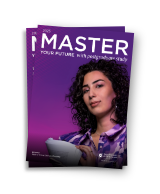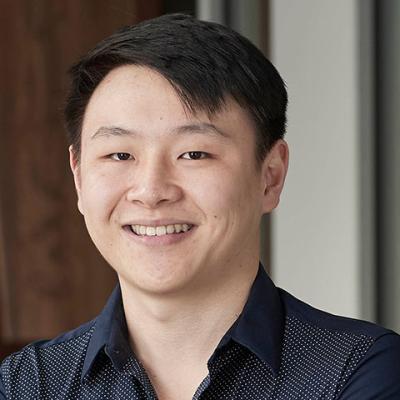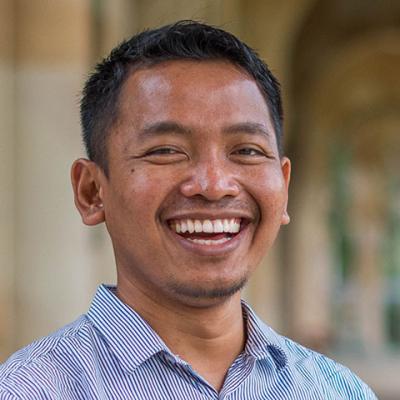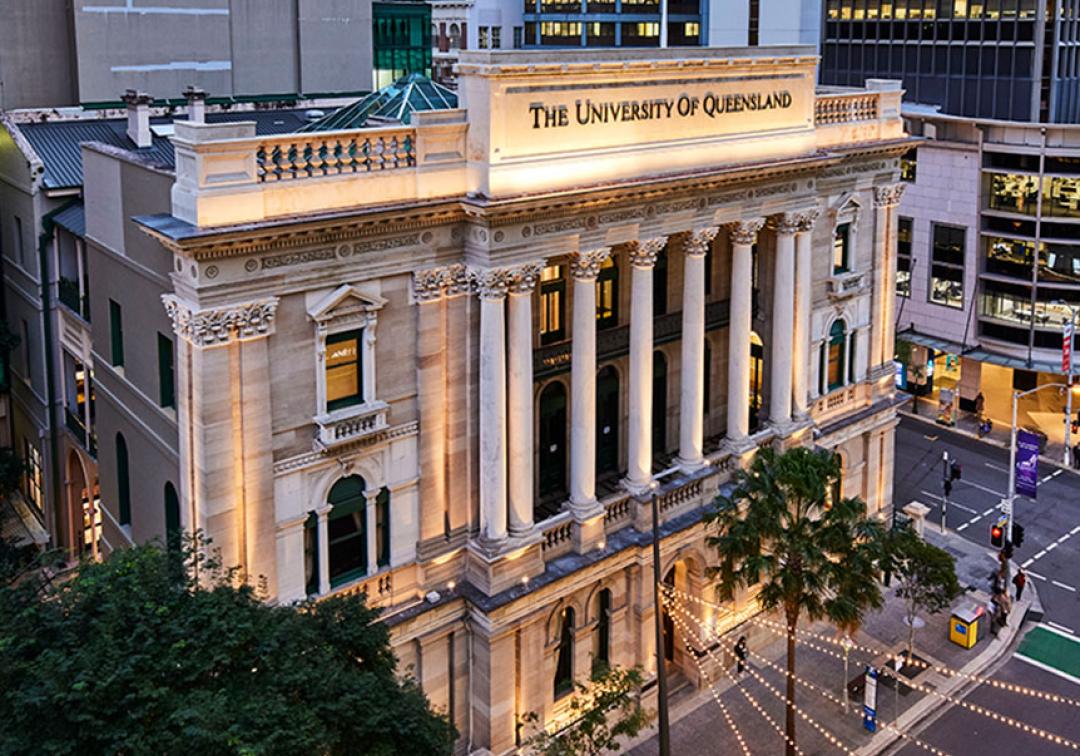
Master of Economics
Overview
Invest in your career success with high-level analytical and decision-making skills sought after by employers.
Taught by world-class academic staff, the Master of Economics will equip you with the tools to solve complex challenges, and the expertise to succeed in a dynamic and increasingly competitive environment.
You'll choose a broad foundation for a wide range of career options, or specialise in Applied Econometrics, Economics and Public Policy, or Health Economics.
You'll develop your analytical ability, critical thinking and logic with comprehensive training in core economics principles. You’ll graduate with a diverse set of skills that can be applied in a wide range of career opportunities.
As a student, you'll experience interactive, engaging and practical teaching. Learn from evaluations, projects and case studies via a blend of flexible online activities, workshops and in-person classes.
The program requires no prior knowledge of economics.
Program highlights
- Graduate with the abilities you need to succeed in a dynamic and increasingly competitive world.
- Complement core skills and knowledge with electives in line with your interests.
- Complete a research thesis or enhance your employability skills with a graduate placement.
Fields of study
Tailor your studies to suit your goals. This program offers these options:
- Applied Econometrics
- Economics and Public Policy
- Health Economics
How you'll learn
Your learning experiences are designed to best suit the learning outcomes of the courses you choose.
- Lectures
- Tutorials
- Research experience
- Workshops
What you'll study
At UQ, degrees are called 'programs' and subjects are called 'courses'. Here's a sample of the courses you could study in this program:
- Economics of Financial Markets
- Globalisation and Economic Development
- Foundations of Public Health
- Health Economics
Career possibilities
Postgraduate study can take you anywhere. Depending on which field you choose, here are some of the careers you could be on your way to:
- Strategy and economics analyst
- Economic policy analyst
- Infrastructure and investment adviser
- Policy and research analyst
- Quantitative behavioural strategist
- Data analyst
Professional memberships
When you graduate, you may be eligible for memberships with the following professional organisations. Contact the organisation to find out how to become a member.
- Australian Agricultural and Resource Economics Society
- Australian Health Economics Society
- Economic Society of Australia
- The Statistical Society of Australia
Events
See all events
7 April - 22 September
Beginner Language Bootcamp at UQ IML
Stories
See all stories
Careers
Predicting the unpredictable: 6 key behavioural economics concepts
6-minute read

Careers
Finance vs economics: what you need to know
4-minute read
Stories
See all stories
Careers
Predicting the unpredictable: 6 key behavioural economics concepts
6-minute read

Careers
Finance vs economics: what you need to know
4-minute read
Entry requirements
Entry requirements
It's possible to complete this degree in 2 years or 1.5 years depending on your qualifications and experience.
You can apply for any duration as long as you meet the entry requirements. You may also be eligible to apply for credit or exemptions to shorten your degree further. You'll graduate with the same qualification no matter how long you take to complete the degree.
2-year degree (32 units of study)
To be eligible to complete the degree in 2 years full-time (or part-time equivalent)full-time (only available as full-time study), you'll need:
- a bachelor's degree (or equivalent) in any discipline, or
- a Graduate Certificate in Economic Studies from UQ, or
- a Graduate Diploma in Economics from UQ.
You must have a grade point average (GPA) of 4.5 on a 7-point scale in your previous qualification.
1.5-year degree (24 units of study)
If you have relevant prior learning or experience, you can reduce the number of courses you need to complete and graduate in less time.
To be eligible to complete the degree in 1.5 years full-time (or part-time equivalent)full-time (only available as full-time study), you'll need:
- a bachelor's degree (or equivalent) in a relevant discipline (see below), or
- a Graduate Certificate in Economics from UQ.
You must have a grade point average (GPA) of 4.5 on a 7-point scale in your previous qualification.
Relevant disciplines for previous qualifications
Relevant disciplines include:
- a bachelor degree in economics, business or commerce, or
- a bachelor degree containing at least 4 courses in any of the following 3 areas:
- microeconomics
- macroeconomics
- statistics
- mathematics
GPA equivalent
Select where you studied and your qualification to see the GPA equivalent you need to be considered for this program.
Use the GPA equivalent as a guide. When you apply, we’ll calculate your GPA using the UQ grading scale. Any failing grades will be included. Entry requirements are subject to change.
Related programs
Depending on your previous qualifications and current goals, you might want to consider
one of these related programs:
English language requirements
IELTS overall 6.5; reading 6; writing 6; speaking 6; listening 6. For other English Language Proficiency Tests and Scores approved for UQ
TOEFL iBT (including Paper Edition) - Overall 87, listening 19, reading 19, writing 21 and speaking 19.
PTE Academic - Overall Score of 64 and 60 in all sub bands.
BE - A minimum overall grade of 4 plus a minimum grade of C in all macro skills.
CES - Overall 176 and 169 in all sub bands.
OET is not accepted.
There are other ways to meet the English language requirements. For some programs, additional conditions apply.
Student visas
International students who are accepted into full-time study in the Master of Economics are eligible to apply for an Australian student visa (subclass 500).
There are a number of requirements you must satisfy before a visa is granted, including the Genuine Student (GS) requirement.
Fields of study
Fields of study
Tailor your studies to suit your goals. This program offers these options:
The increase in big data has highlighted the challenges that organisations face with interpreting data. Develop your expertise in applying statistical methods to economic data, so you can provide quantitative insights, predict change and inform decision-making.
Develop a high level of proficiency in econometrics that builds on the significant economic knowledge you gained from undergraduate study. You'll work on projects to develop advanced qualitative skills and abilities in critical thinking and logic. Grow your confidence through case studies, problem sets and portfolio management to propose viable solutions for complex data problems.
Experience flexible, engaging, and interactive teaching through a blended learning approach of online activities, workshops and face-to-face contact with staff and peers.
You’ll graduate with the skills and knowledge to succeed in a wide variety of economics and finance-related fields, including macroeconomics, quantitative finance, environmental and natural resource management, health, public sector management, business and economic modelling.
This interdisciplinary field examines the complex relationship between public policy, governance and economics. You’ll learn the latest economic research from world-class teaching staff, including how governments develop policy and how their intervention affects the global economy.
Explore international issues like the far-reaching impacts of economic policy, and how can we better understand the cost-benefit of migration. You'll gain the knowledge to be a leading authority in public sector economics and analysis, with the skills to effect social change and improve economic and community welfare.
We adopt a unique economics-first approach to public policy, allowing students with no prior economics knowledge to gain in-depth knowledge of economic concepts. Drawing on knowledge from the School of Economics and the School of Political Science, you'll cover microeconomics, macroeconomics, econometrics, political science, public policy and the contribution of economic analysis to public policy. You can choose to undertake a research component that may provide a pathway to a higher research degree.
You’ll experience flexible, engaging, and real-world teaching that prepares you to actively contribute to the development of public policy within government departments, the public sector, inter-governmental organisations and consultancy.
The Health Economics field of study delivers cutting-edge teaching from world-class academics and expert health economists from the School of Economics and the Centre of the Business and Economics of Health.
You’ll graduate with the tools to create change and lead solutions in health policy and healthcare, so you can contribute to the long-term sustainability of healthcare systems in Australia or overseas. Redefine your career in a specialty field with ever-increasing demand.
Designed for recent graduates or healthcare professionals without an economics undergraduate degree, the program provides a strong foundation in core economic and public health principles.
Fields of study
Tailor your studies to suit your goals. This program offers these options:
The increase in big data has highlighted the challenges that organisations face with interpreting data. Develop your expertise in applying statistical methods to economic data, so you can provide quantitative insights, predict change and inform decision-making.
Develop a high level of proficiency in econometrics that builds on the significant economic knowledge you gained from undergraduate study. You'll work on projects to develop advanced qualitative skills and abilities in critical thinking and logic. Grow your confidence through case studies, problem sets and portfolio management to propose viable solutions for complex data problems.
Experience flexible, engaging, and interactive teaching through a blended learning approach of online activities, workshops and face-to-face contact with staff and peers.
You’ll graduate with the skills and knowledge to succeed in a wide variety of economics and finance-related fields, including macroeconomics, quantitative finance, environmental and natural resource management, health, public sector management, business and economic modelling.
This interdisciplinary field examines the complex relationship between public policy, governance and economics. You’ll learn the latest economic research from world-class teaching staff, including how governments develop policy and how their intervention affects the global economy.
Explore international issues like the far-reaching impacts of economic policy, and how can we better understand the cost-benefit of migration. You'll gain the knowledge to be a leading authority in public sector economics and analysis, with the skills to effect social change and improve economic and community welfare.
We adopt a unique economics-first approach to public policy, allowing students with no prior economics knowledge to gain in-depth knowledge of economic concepts. Drawing on knowledge from the School of Economics and the School of Political Science, you'll cover microeconomics, macroeconomics, econometrics, political science, public policy and the contribution of economic analysis to public policy. You can choose to undertake a research component that may provide a pathway to a higher research degree.
You’ll experience flexible, engaging, and real-world teaching that prepares you to actively contribute to the development of public policy within government departments, the public sector, inter-governmental organisations and consultancy.
The Health Economics field of study delivers cutting-edge teaching from world-class academics and expert health economists from the School of Economics and the Centre of the Business and Economics of Health.
You’ll graduate with the tools to create change and lead solutions in health policy and healthcare, so you can contribute to the long-term sustainability of healthcare systems in Australia or overseas. Redefine your career in a specialty field with ever-increasing demand.
Designed for recent graduates or healthcare professionals without an economics undergraduate degree, the program provides a strong foundation in core economic and public health principles.
Fees and Scholarships
Indicative annual fee
Approximate yearly cost of tuition (16 units). Your fees will vary according to your study load. Fees are reviewed each year and may increase.
$41,840
2025
$41,840
2025
Approximate yearly cost of full-time tuition (16 units). Your fees will vary according to your study load. Fees are reviewed each year and may increase.
AUD $50,560
2025
AUD $50,560
2025
Government assistance
Financial aid
As an international student, you might be eligible for financial aid – either from your home country, or from the Australian Government.
FEE-HELP
Domestic students who are accepted into the Master of Economics pay tuition fees.
FEE-HELP is an Australian Government loan scheme to assist eligible students with the cost of their tuition fees.
Centrelink support
The Australian Government offers a number of income-support payments to eligible Australian university students.
Scholarships
You may be eligible for more than 100 scholarships, including:
...Loading
How to apply
Applying online
All international applications should be submitted to UQ. If you prefer, you can use an approved UQ agent in your country.
The program code for the Master of Economics is 5399.
This program is available in multiple durations. You can apply for any duration as long as you meet the entry requirements.
When you apply, select your preferred duration. If you don't meet the requirements for your first preference, we'll automatically consider you for entry into a longer duration.
Find out more about applying for postgraduate coursework study
Applying online
All domestic applications should be submitted to UQ.
The program code for the Master of Economics is 5399.
This program is available in multiple durations. You can apply for any duration as long as you meet the entry requirements.
When you apply, select your preferred duration. You can also ask us to consider you for a longer duration if you don't meet the entry requirements for your first preference.
Find out more about applying for postgraduate coursework study
Important dates
The closing date for this program is:
- To commence study in semester 2 - May 31 of the year of commencement.
- To commence study in semester 1 - November 30 of the previous year.
To learn more about UQ dates, including semester start dates, view the Academic Calendar.
Important dates
The closing date for this program is:
- To commence study in Semester 1 - January 31 of the year of commencement.
- To commence study in Semester 2 - June 30 of the year of commencement.
To learn more about UQ dates, including semester start dates, view the Academic Calendar.
Aboriginal and Torres Strait Islander applicants
For support with applying – or if you have any questions about university life – get in touch with our Aboriginal and Torres Strait Islander Studies Unit.
Explore other programs
Express yourself. And your interest.
They say choosing a degree is hard, which is why we've made it easy. Register your interest and we'll send you everything you need to know about applying to UQ.







